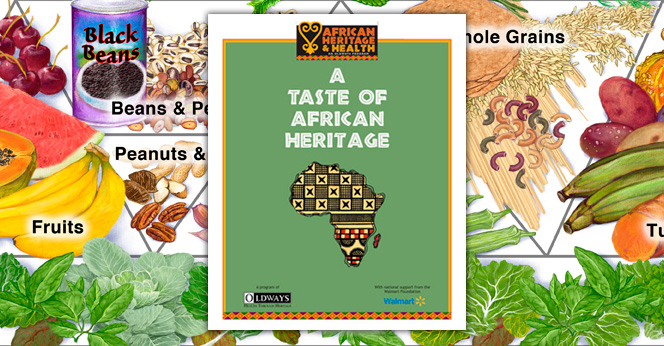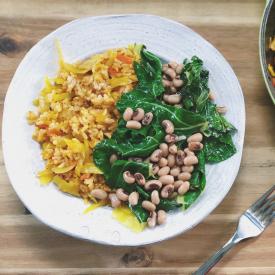Share This
In past blog posts we have shared insights into our A Taste of African Heritage classes and today we are so excited to share some of what our A Taste of African Heritage (ATAH) graduates are saying! The reviews have been glowing, and student feedback has been full of enthusiasm, helpful suggestions, and wonderful success stories.
At Oldways, we believe that healthy, vegetable-centered, whole food eating and cooking is made more possible through a cultural, historical lens—the old ways. We are very happy that our ATAH students are finding this to be true.
When we asked graduates to share the biggest obstacles getting in the way of their cooking and eating healthfully, they said:
- Taste
- Time
- Busy work schedule
- Money, costs
- Temptation gets in the way; I love to eat what I know I can’t have anymore
- Family and takeout. Time and accessibility
- Lack of knowledge
We also asked, “Has this program changed the way you eat? If so, how?” Here are just some of the healthy changes (SPOILER: This program definitely helps you eat your veggies!):
- Eating more fruits and vegetables and plant-based meals.
- I observe more at the grocery store, and I look for more fresh veggies.
- Yes, I eat vegetables and greens daily since I started this class.
- Less meat, more beans.
- Yes, I am eating more vegetables and enjoying and preparing them which encourages me to try more recipes.
- Using more herbs and spices and I am more conscious about my sodium intake.
- Yes, I incorporate more vegetables as a main meal/foundation.
- Absolutely, I am much more comfortable with a variety of greens, beans, and grains.
- I try more combinations—especially things I would not usually think would go together.
- More green vegetables, more exercise, more water, live by the pyramid.
We asked graduates to share the most useful thing that they learned in this class series. Here are some of the most useful take-aways that students shared:
- The variety of nutritious foods that originated from the African culture.
- Healing properties of spices.
- The most useful thing I learned was to not eat a lot of meat, eat more vegetables.
- I cook more with olive oil and garlic now.
- The variety of different beans and vegetables – how to cook and enjoy food without meat.
- How to use peanut butter in cooking, how to cook green vegetables, and how to eat more greens, more beans, more whole grains.
- Ways to cook healthy, good tasting food.
- How to use spices to add flavor to foods.
- I learned how to change the way I usually cook vegetables and how to take vegetables as the main course and build around the vegetables instead of focusing on the meat.
- Don’t take a lot of time to prepare dishes.
- That African-based cooking – veggies, grains, etc. – is a tasty satisfying way of eating. It has changed how I will eat from now on.
- Mixing various vegetables i.e. Collards & Potatoes—who knew?!
A successful cooking class inspires its students to cook at home. We asked graduates if they had prepared any of the in-class recipes at home. 85% of them had. Here’s a sampling of what students have been cooking up:
- Senegalese soup [a peanut stew with sweet potatoes and vegetables]
- Yes, quinoa
- I cooked the black eyed pea salad, couscous with peppers, and rice and beans
- Yes, vegetables more often, smoothies, no frying, baking more, salads
- The spices, the irio [vegetable mashed potatoes], and the peanut butter soup
- Peanut soup
- Oldways Spicy Chickpeas and Tangy Collard Greens
- Tangy collards
- Jollof rice, spicy chickpeas, and black eyed pea salad
- Yes, couscous, vegetable stew, greens, smoothie
- Jollof rice and green smoothie
- Sweet potato peanut stew; couscous
- Caribbean coconut beans and mashed kale with potatoes (the Irio)
- The seasoned cabbage and rice. My children enjoyed it!
We had so many wonderful “Additional Comments” about the program, we thought we’d just pick our favorite one:
“It makes you appreciate your heritage and teaches you how healthy your heritage is.”
We believe that the success of A Taste of African Heritage is due in part to three significant factors:
- People are ready to make “healthy eating” the new norm, and they are motivated by history and heritage!
- Our volunteer teachers are outstanding leaders in their communities, and the Taste of African Heritage curriculum allows them to bring their passions for food, health and culture to every class.
- And, finally, the “old ways” are the most enjoyable way to adopt a healthy diet and lifestyle, day to day, without compromising flavor. Traditional cuisines make “eating your vegetables” a vibrant, pleasurable, cultural affair!
We hope that you’re encouraged too! If you’d like to join us as a teacher or a student in a Taste of African Heritage Class Series near you, please contact Sarah Anderson at sanderson@oldwayspt.org



Add a Comment